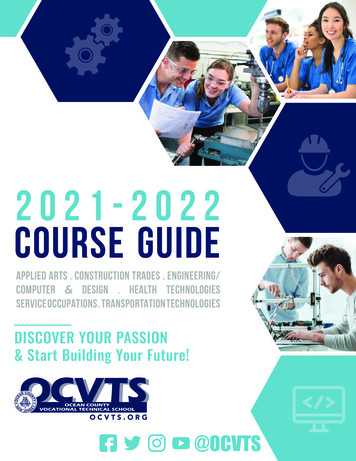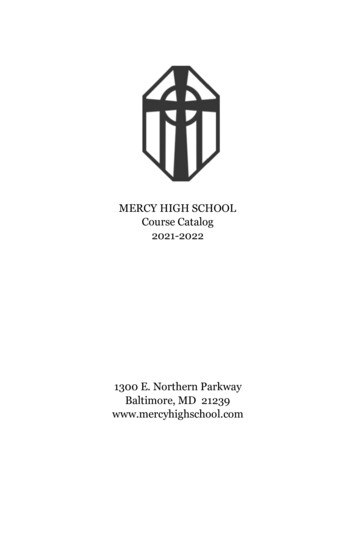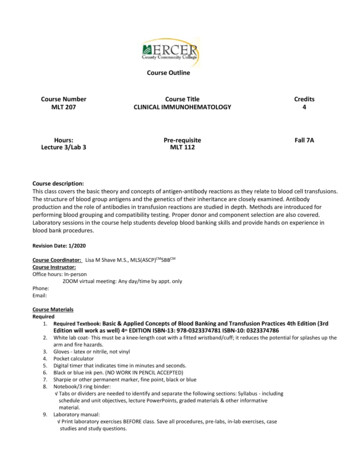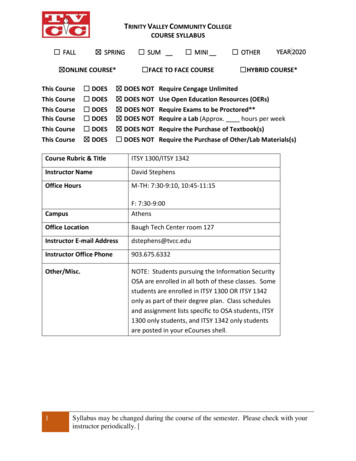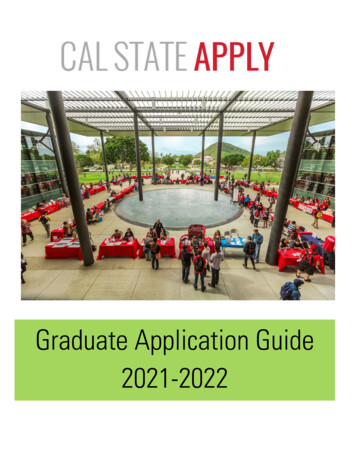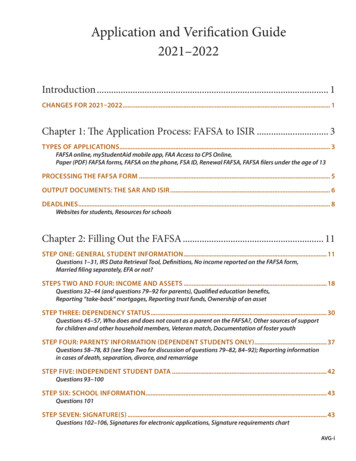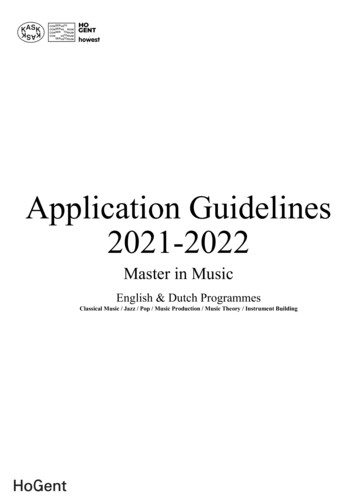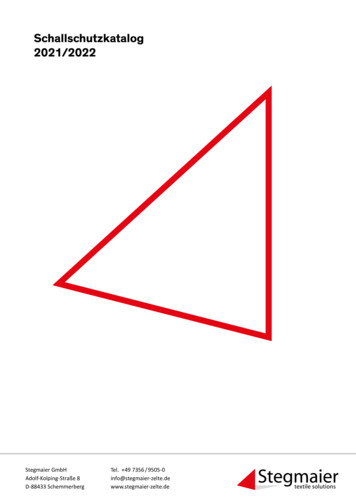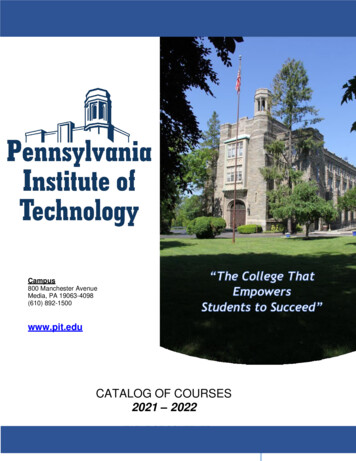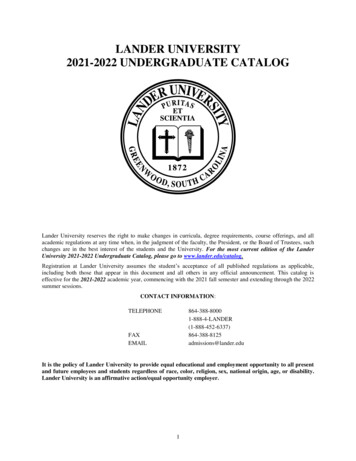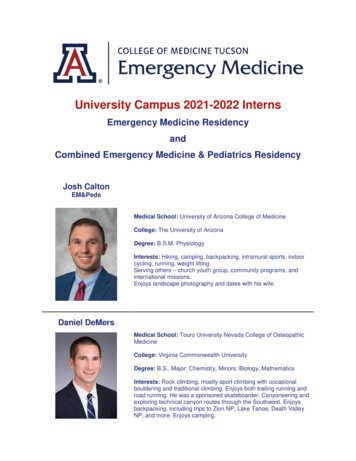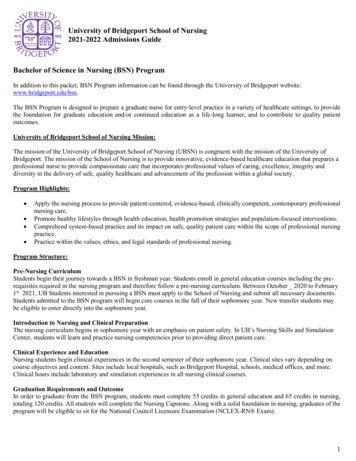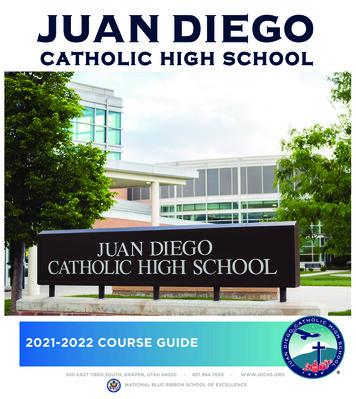
Transcription
2021-2022 COURSE GUIDE300 EAST 11800 SOUTH, DRAPER, UTAH 84020-801.984.7650-WWW.JDCHS.ORGNATIONAL BLUE RIBBON SCHOOL OF EXCELLENCE
2021-2022 Course Guide - Juan Diego Catholic High SchoolCOURSE REQUIREMENTS & DISCLOSURESAP COURSE REQUIREMENTS Students and parents are required to sign anexpectation contract. There is a fee for therequired end-of-year AP exam. College creditmay be earned with an appropriate score on theexam.2020-2021 AP Exam Fees:(2021-22 fees are not yet available)AP Research or AP SeminarAll other AP Exams 149 per exam 99 per examCONCURRENT COURSESJuan Diego offers concurrent or dual enrollment options through Utah Valley University.This concurrent track offers students potentialcollege credits that transfer to colleges anduniversities in Utah and many out-of-stateschools. College credit is offered to students, solong as they meet certain grade or test thresholds required by the university. Credit hoursoffered vary by course. Students are responsible for college enrollment/courses fees and thepurchase of textbooks. A UVU application fee,good for two years, and a Utah state fee mustbe paid online with a credit card during the firsttwo weeks of the course. A course tuition feeof 25 per UVU credit hour (2020-21 rate) ispaid directly to Juan Diego. College transcriptswill be available from Utah Valley University forthose who complete the course with a grade ofC or higher and have paid the three fees in full.Students must complete the college registration process and pay fees within JD mandateddeadlines or students will be removed from thecourse. Parental permission may be required toenroll in the colleges.Juan Diego also will be offering concurrentcourses through Arizona State University. Thisconcurrent track offers students potentialcollege credit that will transfer to most accredited universities. Credit hours offered varyby course. The amount to participate throughASU’s Universal Learner Coursework consists ofa 25* registration fee as well as a 400* creditconversion fee (*estimated amount), studentscan opt to just take the course and not pay forthe credit conversion. Each student who passes the course has up to one calendar year tocomplete the credit conversion payment. TheseASU courses will be taught collaboratively bythe college professor as well as our Juan Diegodesignated teacher.ONLINE BLENDED LEARNINGCOURSES (OBLN)Courses offered at Juan Diego may be a “blended” online course taught in conjunction with theJuab School District (in partnership with Arizona State University) or Canyons School District.Juan Diego provides the “in-class” portion ofthe content and the teacher for the class itself.2THEOLOGY8 semesters4 credits4 yearsENGLISH8 semesters4 credits4 yearsSOCIAL STUDIES8 semesters4 credits4 yearsMATHEMATICS8 semesters4 credits4 yearsSCIENCE6 semesters3 credits3 yearsWORLD LANGUAGES4 semesters2 credits2 yearsFINE ARTS2 semesters*1 credit1 yearCOMPUTER SCIENCE1 semester1/2 credit1/2 yearHEALTH1 semester1/2 credit1/2 yearPHYSICAL EDUCATION3 semesters1 1/2 credits1 1/2 yearsELECTIVES9 semesters4 1/2 creditsCredits earned prior to high school will not be counted towards graduation requirements.*Beginning with the Class of 2025 3 semesters will be required.In many ways, these blended-learning onlineclasses look and feel like other classes offeredat Juan Diego. The key difference in this approach is that students have 24-hour virtualaccess to the learning materials (handouts,interactive presentations, quizzes, test-preps,etc.) with faculty present (in the classroom andonline) to develop, guide, and provide a digitaldialog with students as they progress throughthe semester. There are no additional online feesfor these courses.ASU CONCURRENT COURSES2331C College Algebra and Trigonometry (Conc)2339C College Math Preview (Conc)UVU CONCURRENT COURSES242AP AP Calculus AB (AdvancedPlacement)532C World History Modern (Conc)2450AP AP Calculus BC (AdvancedPlacement)541C United States Government (Conc)3651C Astronomy (Conc)542C Economics (Conc)451C Introduction to College Writing(Conc)642C Spanish IV (Conc)4532C Poetry in America (Conc)
2021-2022 Course Guide - Juan Diego Catholic High Schoolat Juan Diego Catholic High SchoolAP Capstone is an innovative diploma program from the College Board that equips students with the independent research, collaborative teamwork,and communication skills that are increasingly valued by colleges. AP Capstone is built on the foundation of two AP courses — AP Seminar and APResearch — and is designed to complement and enhance the in-depth, discipline-specific study experienced in other AP courses. Courses designatedas “Capstone Core” are an integral part of the AP Capstone experience at Juan Diego. Courses designated as “Capstone Suggested” prepare studentsfor the rigors of the Juan Diego AP Capstone program.In AP Seminar, students investigate real-world issues from multiple perspectives, gathering and analyzing information from various sources in order todevelop credible and valid evidence-based arguments. In AP Research students cultivate the skills and discipline necessary to conduct independent research in order to produce and defend a scholarly academic thesis. AP Seminar is a prerequisite for AP Research. Students may not take AP Researchwithout completing AP Seminar and all the required assessment components as they will not have developed the skills necessary to be successful inAP Research.AP CAPSTONE COURSES3720AP AP Seminar (Capstone Core)(Advanced Placement) Initial course in the AP Capstone diplomaprogram. Prerequisite: Application process.AP Seminar is the first of two required coursesin the AP Capstone sequence, and also servesas the sophomore English credit for eligiblestudents.In AP Seminar students tackle a wide varietyof literary, philosophical, historical and currentevents readings, and write multiple essaysanalyzing the argumentation in these readingsand synthesizing sources into original argumentative essays. Students also write three researchpapers and make three videotaped oral presentations; the last two of each are uploaded to theCollege Board and serve as part of the student’s AP score. Students are admitted to thecourse through an application process based onPreACT test scores, teacher recommendations,and fully submitted application. Students mustbe concurrently enrolled in AP World History.This demanding course requires students tocomplete long-term projects and meet multipledeadlines.5320AP AP World History Modern(Capstone Core)(Advanced Placement) (OBLN) Course description located in Social Studies1333 / 1334 Capstone Theology I/II(Capstone Core)Course description located in Theology571AP AP Art History(Capstone Suggested)(Advanced Placement) (OBLN) Course description located in Social Studies4150H Global Literature (Honors)(Capstone Suggested)Freshman students onlyCourse description located in English4430AP AP English Language andComposition441AP AP English Literature571AP AP Art History522AP AP European History531AP AP US History5320AP AP World History Modern543AP AP Gov/Politics: US545AP AP Comparative Governmentand Politics583AP AP PsychologyAP COURSES642AP AP Spanish2350AP AP Statistics643AP AP French Language and Culture242AP AP Calculus AB858AP AP Music Theory3730AP AP Research (Capstone Core)(Advanced Placement) 2450AP AP Calculus BC899AP AP Art and DesignPrerequisite: AP Seminar and departmentalapprovalAP Research is the second component in theAP Capstone sequence. To enroll, students musthave completed AP Seminar. In AP Researchstudents build on the reading, research andwriting skills developed in AP Seminar, to develop an original line of inquiry on a topic of theirchoice. Students learn to formulate researchquestions, design a study to answer those research questions, and then carry out their studydesign. Critical thinking, problem-solving, andindependent learning are exercised throughoutthe class. The course culminates with a 5,000word individual research paper, and a 15-20minute presentation and oral defense of thestudents’ work.333AP AP Biology9610AP AP Computer Science A332AP AP Chemistry9611AP AP Computer SciencePrinciples33550AP AP Environmental Science3411AP AP Physics 13420AP AP Physics C3421AP AP Physics 23720AP AP Seminar3730AP AP Research
2021-2022 Course Guide - Juan Diego Catholic High School100 THEOLOGYStudents are required to complete one year ofTheology for each year enrolled at Juan DiegoCatholic High School.FRESHMAN1131/1132 Freshman Theology I/II: TheRevelation of Jesus Christ in ScriptureThis course is an introduction to what it meansto be a Juan Diego student as well as an introductory investigation of the revelation of JesusChrist as found in Sacred Scripture. The purpose of this course is to give students a general knowledge and appreciation of the Bible.Through their study, they will come to encounter the living Word of God, Jesus Christ. Students will learn about the Bible, as authored byGod through inspiration, and its value to peoplethroughout the world. Students new to readingscripture will learn how to read the Bible andbecome familiar with the major sections of theBible. Alongside scripture study, students willbe working with the “Principles and Choices”program where the text Identity and Values willchallenge how they define happiness, successand love. This program addresses various spiritual, social, and emotional developmental issuesthat challenge and confront adolescents today.Topics presented and discussed are rooted inGospel values and virtues, using Jesus’ greatestcommandment as the foundation for the development of both a character and conscience thatdemonstrates who Jesus calls us to be.SOPHOMORE1231 Sophomore Theology I:The Mission of Jesus Christ (The Paschal Mystery)The purpose of this course is to help studentsunderstand all that God has done for us throughhis Son, Jesus Christ. Through this course ofstudy, students will learn that for all eternity,God has planned for us to share eternal happiness with him, which is accomplished throughthe redemption Christ won for us. Students willlearn that they share in this redemption onlyin and through Jesus Christ. They will also beintroduced to what it means to be a disciple ofChrist and what life as a disciple entails.1232 Sophomore Theology II:Jesus Christ’s Mission Continues in theChurchThe purpose of this course is to help the students understand that in and through theChurch they encounter the living Jesus Christ.They will be introduced to the fact that theChurch was founded by Christ through theApostles and is sustained by him through theHoly Spirit. The students will come to know thatthe Church is the living Body of Christ today.4This Body has both divine and human elements.In this course, students will learn not so muchabout events in the life of the Church, but aboutthe sacred nature of the Church.JUNIOR1331 Junior Theology I: Sacramentsas Privileged Encounters with JesusChristThe purpose of this course is to help studentsunderstand that they can encounter Christtoday in a full and real way through the sacraments, and especially through the Eucharist.Students will examine each of the sacramentsin detail so as to learn how they may encounterChrist throughout life.1332 Junior Theology II: Life in JesusChristThe purpose of this course is to help studentsunderstand that it is only through Christ thatthey can fully live out God’s plan for their lives.Students are to learn the moral concepts andprecepts that govern the lives of Christ’s disciples.1333 / 1334 Capstone Theology I/II:The Philosophy of Religion (CapstoneCore)Prerequisite: Approval of both Theology andAP Capstone Department HeadsWhat makes an object an object? What is thefundamental nature of the universe? How canwe eat Jesus Christ, and what does that sayabout God? Does evil actually exist, or is itthe absence of good? In Capstone theologystudents explore some of the biggest questions of existence from the Bishop’s curricularframework of Sacraments and Ethics. Junior willbuild on their backgrounds in art, history, andargumentation they’ve developed through theCapstone program.SENIOR1421 Catholic Social TeachingFall SemesterStudents study the principles of Catholic SocialTeaching and their applications to contemporary justice issues such as hunger, war andpeacemaking, workers and worker rights, ecological problems and economic systems. Thecourse stresses magisterial teaching drawn fromthe Catechism of the Catholic Church, Papalencyclicals, Council documents, and pastoralstatements from the USCCB. Students critiquecontemporary values and discuss moral choices in light of the Gospel message and Churchteachings.1453 Ecumenical and InterreligiousDialogueSpring SemesterThe purpose of this course is to help studentsunderstand the manner in which the CatholicChurch relates to non-Catholic Christians as wellas to other religions of the world. The course isintended to help students recognize the waysin which important spiritual truths can also befound in non-Catholic Christian churches andecclesial communities as well as in non-Christianreligions. It is also intended to help them recognize the ways in which other systems of beliefand practice differ from the Catholic faith.1462 Peer MinistryFull Year CourseApplication, recommendations, and interviewprocesses are required. Students chosen forthis course will fulfill their service requirement.Class content will include the developing anddeepening of one’s personal spirituality andprayer life; skills training in interpersonal relationships and group process; vocational discernment and the call to discipleship; and practicalways to become agents of change in promotinga just society. Students will receive training forassuming leadership roles in the liturgical andministerial life of the school; as well as, assistingnew students in their transition to high school.1465 Social Justice LeadershipFull Year CourseApplication, recommendations, and interviewprocesses are requiredStudents will learn the principles of CatholicSocial Teaching and their applications to contemporary justice issues including inequality,discrimination, human rights, poverty, creation,etc. As a component of Campus Life, this coursetakes time to build relationships and awarenesswithin our school community and our world.This course seeks to engage students and thegreater community on all levels of communication including discussion, activities, simulations,and student driven learning.
2021-2022 Course Guide - Juan Diego Catholic High School200 MATHEMATICSacademic geometry course. Since proficiencywith signed numbers, fractions, decimals, andpercents are fundamental to success in highschool mathematics classes, students are regularly assessed on these skills as well as on thecourse material.222 Algebra II (Academic) (OBLN)Students are required to earn four (4) creditsin mathematics for graduation. All math placement is based on grade history, test scores,and teacher recommendation. Freshmen whohave mastered Algebra I and demonstrateproficiency through both the educational assessment exam and the qualifying exams maybegin high school work in Geometry (Honors), Algebra II (Honors), or higher. Academiccourses above Algebra I are NOT offered tofreshmen. ALEKS, a web-based software program, is a required component of most mathclasses. TI-84 (or equivalent) graphing calculators are required for coursework in Algebra IIand above.2000 Math 1 (OBLN)Semester CourseThis freshman required course reinforces existing arithmetic, algebra and geometry skills andexplores concepts students will need to masterin order to further their study of mathematics.This course is not required for freshmen enrolled in Geometry Honors or higher.2112 Foundations HS Math (OBLN)This course is for students who need to shoreup their arithmetic and pre-algebra skillsbefore taking Algebra I. The class will includeintense study and drill of arithmetic concepts,including operations on integers, fractions, anddecimals; a thorough treatment of percent;arithmetic word problems; and pre-algebraconcepts to prepare for Algebra I. ALEKS, aweb-based software program, is a requiredcomponent of this class.212 Algebra I (Academic) (OBLN)Students in this course may or may not havehad an algebra course in an earlier grade, butare expected to have mastered the arithmeticskills necessary for success in high school-level mathematics. Since proficiency with signednumbers, fractions, decimals, and percents arefundamental to success in ensuing high schoolmathematics classes, students are regularlyassessed on these skills as well as on the coursematerial. The successful student in this course iswilling to practice each concept thoroughly and5Prerequisites: Algebra I and GeometryThis course is geared toward Juniors and Seniors completing the standard college preparatory sequence of Algebra I, Geometry, andAlgebra II. Students will review and deepentheir understanding of concepts learned inAlgebra I. Proficiency in solving word problemsis also stressed. Since proficiency with signednumbers, fractions, decimals, and percents arefundamental to success in high school mathematics classes, students are regularly assessedon these skills as well as on the course material.understands that the concepts in this courseare the foundation of high school and collegemathematics.2141H Enriched Algebra I (Honors)(OBLN)Prerequisites: Departmental approvalTopics include properties of the real numbersystem, linear and quadratic equations andinequalities, functions, systems of linear equations and inequalities, properties of exponents,and exponential growth and decay. Emphasis ison developing conceptual understanding andinterpreting solutions in the context of a problem situation.231 Geometry (Academic) (OBLN)Prerequisite: Algebra IThe investigation of two-dimensional geometricfigures (triangles, polygons, circles, etc.) leadsstudents to the study of three-dimensionalobjects such as cones, cylinders, and prisms.This course includes a thorough study of planegeometry, including its formation, language,and applications. Since proficiency with signednumbers, fractions, decimals, and percents arefundamental to success in high school mathematics classes, students are regularly assessedon these skills as well as on the course material.2310H Geometry (Honors) (OBLN)Prerequisite: Algebra I (Honors)This course is designed for the above-averagemath student who can handle a faster-pacedcourse as well as an in-depth study of the topics. This is a student who has mastered AlgebraI and who is interested in the Calculus track inhigh school. The course will cover standard geometry topics in 2 and 3 dimensions. Studentswill also make extensive use of deductive andinductive reasoning in discovering and proving geometric theorems, as well as in problem-solving. The course will also include a morethorough introduction to analytic geometryand plane trigonometry than is covered in the2220H Algebra II (Honors) (OBLN)Prerequisites: Algebra I and GeometryThis is an accelerated course in Algebra designed for students who intend to take Calculuswhile in high school. Algebra II explores morecomplex algebra problems, including solvingand graphing linear, quadratic, exponential,rational, and logarithmic functions. The honorslevel Algebra II course will cover material at anaccelerated rate. Emphasis will be placed onsolving more challenging problems to betterprepare students for higher math.2331C College Algebra and Trigonometry (Conc)Prerequisites: Algebra I and GeometryThis is an intensive course designed for studentswho completed Geometry (Honors) with a Baverage or better and intend to take Calculuswhile in high school. College Algebra and Trig isa combined Algebra II and Precalculus course.Topics include algebraic and graphical analysisof complex numbers, quadratic, polynomial,rational, and radical functions, analytic geometry and conic sections, exponential
Credit hours offered vary by course. Students are responsi-ble for college enrollment/courses fees and the purchase of textbooks. A UVU application fee, good for two years, and a Utah state fee must be paid online with a credit card during the first two weeks of the course. A course tuition fee of
